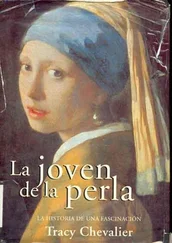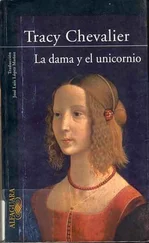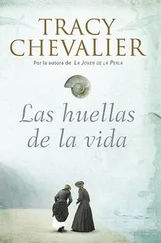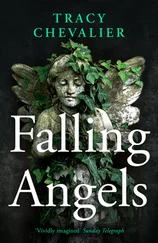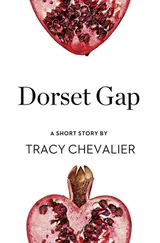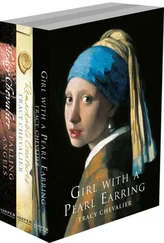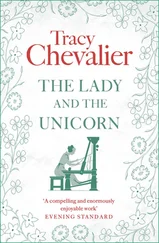Tracy Chevalier - Girl with a Pearl Earring
Здесь есть возможность читать онлайн «Tracy Chevalier - Girl with a Pearl Earring» — ознакомительный отрывок электронной книги совершенно бесплатно, а после прочтения отрывка купить полную версию. В некоторых случаях можно слушать аудио, скачать через торрент в формате fb2 и присутствует краткое содержание. Город: New York, Год выпуска: 1999, ISBN: 1999, Издательство: A Penguin Book, Жанр: Классическая проза, на английском языке. Описание произведения, (предисловие) а так же отзывы посетителей доступны на портале библиотеки ЛибКат.
- Название:Girl with a Pearl Earring
- Автор:
- Издательство:A Penguin Book
- Жанр:
- Год:1999
- Город:New York
- ISBN:0-7865-2016-7
- Рейтинг книги:4 / 5. Голосов: 1
-
Избранное:Добавить в избранное
- Отзывы:
-
Ваша оценка:
- 80
- 1
- 2
- 3
- 4
- 5
Girl with a Pearl Earring: краткое содержание, описание и аннотация
Предлагаем к чтению аннотацию, описание, краткое содержание или предисловие (зависит от того, что написал сам автор книги «Girl with a Pearl Earring»). Если вы не нашли необходимую информацию о книге — напишите в комментариях, мы постараемся отыскать её.
Girl with a Pearl Earring — читать онлайн ознакомительный отрывок
Ниже представлен текст книги, разбитый по страницам. Система сохранения места последней прочитанной страницы, позволяет с удобством читать онлайн бесплатно книгу «Girl with a Pearl Earring», без необходимости каждый раз заново искать на чём Вы остановились. Поставьте закладку, и сможете в любой момент перейти на страницу, на которой закончили чтение.
Интервал:
Закладка:
Tracy Chevalier
Girl with a Pearl Earring
For my father

1664

My mother did not tell me they were coming. Afterwards she said she did not want me to appear nervous. I was surprised, for I thought she knew me well. Strangers would think I was calm. I did not cry as a baby. Only my mother would note the tightness along my jaw, the widening of my already wide eyes.
I was chopping vegetables in the kitchen when I heard voices outside our front door—a woman’s, bright as polished brass, and a man’s, low and dark like the wood of the table I was working on. They were the kind of voices we heard rarely in our house. I could hear rich carpets in their voices, books and pearls and fur.
I was glad that earlier I had scrubbed the front steps so hard.
My mother’s voice—a cooking pot, a flagon—approached from the front room. They were coming to the kitchen. I pushed the leeks I had been chopping into place, then set the knife on the table, wiped my hands on my apron and pressed my lips together to smooth them.
My mother appeared in the doorway, her eyes two warnings. Behind her the woman had to duck her head because she was so tall, taller than the man following her.
All of our family, even my father and brother, were small.
The woman looked as if she had been blown about by the wind, although it was a calm day. Her cap was askew so that tiny blond curls escaped and hung about her forehead like bees which she swatted at impatiently several times. Her collar needed straightening and was not as crisp as it could be. She pushed her gray mantle back from her shoulders, and I saw then that under her dark blue dress a baby was growing. It would arrive by the year’s end, or before.
The woman’s face was like an oval serving plate, flashing at times, dull at others. Her eyes were two light brown buttons, a color I had rarely seen coupled with blond hair. She made a show of watching me hard, but could not fix her attention on me, her eyes darting about the room.
“This is the girl, then,” she said abruptly.
“This is my daughter, Griet,” my mother replied. I nodded respectfully to the man and woman.
“Well. She’s not very big. Is she strong enough?” As the woman turned to look at the man, a fold of her mantle caught the handle of the knife I had been using, knocking it off the table so that it spun across the floor.
The woman cried out.
“Catharina,” the man said calmly. He spoke her name as if he held cinnamon in his mouth. The woman stopped, making an effort to quiet herself.
I stepped over and picked up the knife, polishing the blade on my apron before placing it back on the table. The knife had brushed against the vegetables. I set a piece of carrot back in its place.
The man was watching me, his eyes grey like the sea. He had a long, angular face, and his expression was steady, in contrast to his wife’s, which flickered like a candle. He had no beard or moustache, and I was glad, for it gave him a clean appearance. He wore a black cloak over his shoulders, a white shirt, and a fine lace collar. His hat pressed into hair the red of brick washed by rain.
“What have you been doing here, Griet?” he asked.
I was surprised by the question but knew enough to hide it. “Chopping vegetables, sir. For the soup.”
I always laid vegetables out in a circle, each with its own section like a slice of pie. There were five slices: red cabbage, onions, leeks, carrots, and turnips. I had used a knife edge to shape each slice, and placed a carrot disc in the center.
The man tapped his finger on the table. “Are they laid out in the order in which they will go into the soup?” he suggested, studying the circle.
“No, sir.” I hesitated. I could not say why I had laid out the vegetables as I did. I simply set them as I felt they should be, but I was too frightened to say so to a gentleman.
“I see you have separated the whites,” he said, indicating the turnips and onions. “And then the orange and the purple, they do not sit together. Why is that?” He picked up a shred of cabbage and a piece of carrot and shook them like dice in his hand.
I looked at my mother, who nodded slightly.
“The colors fight when they are side by side, sir.”
He arched his eyebrows, as if he had not expected such a response. “And do you spend much time setting out the vegetables before you make the soup?”
“Oh no, sir,” I replied, confused. I did not want him to think I was idle.
From the corner of my eye I saw a movement. My sister, Agnes, was peering round the doorpost and had shaken her head at my response. I did not often lie. I looked down.
The man turned his head slightly and Agnes disappeared. He dropped the pieces of carrot and cabbage into their slices. The cabbage shred fell partly into the onions. I wanted to reach over and tease it into place. I did not, but he knew that I wanted to. He was testing me.
“That’s enough prattle,” the woman declared. Though she was annoyed with his attention to me, it was me she frowned at. “Tomorrow, then?” She looked at the man before sweeping out of the room, my mother behind her. The man glanced once more at what was to be the soup, then nodded at me and followed the women.
When my mother returned I was sitting by the vegetable wheel. I waited for her to speak. She was hunching her shoulders as if against a winter chill, though it was summer and the kitchen was hot.
“You are to start tomorrow as their maid. If you do well, you will be paid eight stuivers a day. You will live with them.”
I pressed my lips together.
“Don’t look at me like that, Griet,” my mother said. “We have to, now your father has lost his trade.”
“Where do they live?”
“On the Oude Langendijck, where it intersects with the Molenpoort.”
“Papists’ corner? They’re Catholic?”
“You can come home Sundays. They have agreed to that.” My mother cupped her hands around the turnips, scooped them up along with some of the cabbage and onions and dropped them into the pot of water waiting on the fire. The pie slices I had made so carefully were ruined.

I climbed the stairs to see my father. He was sitting at the front of the attic by the window, where the light touched his face. It was the closest he came now to seeing.
Father had been a tile painter, his fingers still stained blue from painting cupids, maids, soldiers, ships, children, fish, flowers, animals onto white tiles, glazing them, firing them, selling them. One day the kiln exploded, taking his eyes and his trade. He was the lucky one—two other men died.
I sat next to him and held his hand.
“I heard,” he said before I could speak. “I heard everything.” His hearing had taken the strength from his missing eyes.
I could not think of anything to say that would not sound reproachful.
“I’m sorry, Griet. I would like to have done better for you.” The place where his eyes had been, where the doctor had sewn shut the skin, looked sorrowful. “But he is a good gentleman, and fair. He will treat you well.” He said nothing about the woman.
“How can you be sure of this, Father? Do you know him?”
“Don’t you know who he is?”
“No.”
“Do you remember the painting we saw in the Town Hall a few years ago, which van Ruijven was displaying after he bought it? It was a view of Delft, from the Rotterdam and Schiedam Gates. With the sky that took up so much of the painting, and the sunlight on some of the buildings.”
Читать дальшеИнтервал:
Закладка:
Похожие книги на «Girl with a Pearl Earring»
Представляем Вашему вниманию похожие книги на «Girl with a Pearl Earring» списком для выбора. Мы отобрали схожую по названию и смыслу литературу в надежде предоставить читателям больше вариантов отыскать новые, интересные, ещё непрочитанные произведения.
Обсуждение, отзывы о книге «Girl with a Pearl Earring» и просто собственные мнения читателей. Оставьте ваши комментарии, напишите, что Вы думаете о произведении, его смысле или главных героях. Укажите что конкретно понравилось, а что нет, и почему Вы так считаете.

